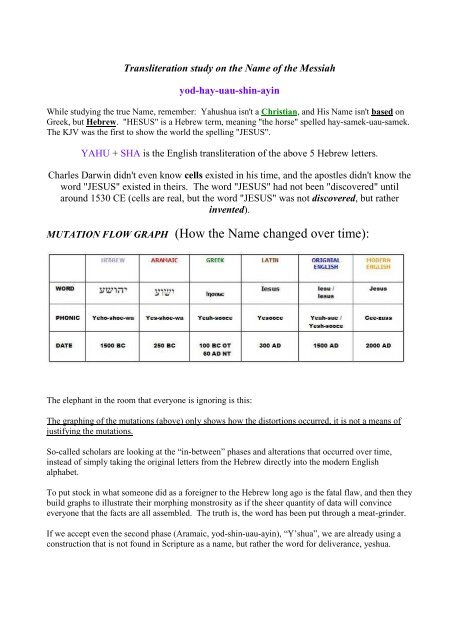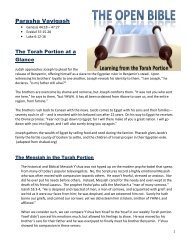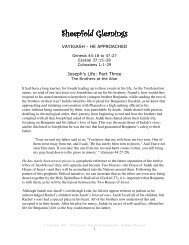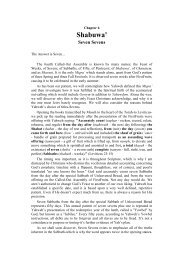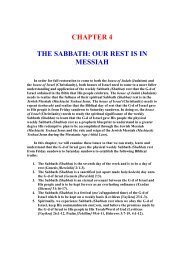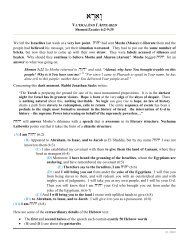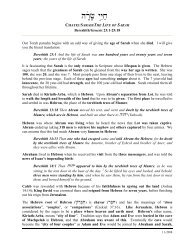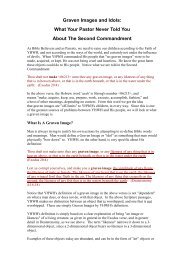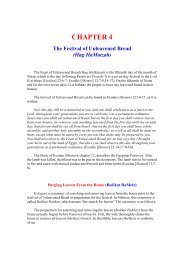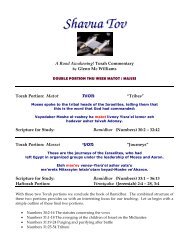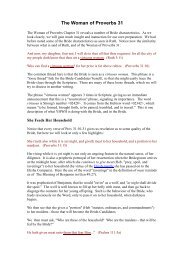Transliteration study on the Name of the Messiah
Transliteration study on the Name of the Messiah
Transliteration study on the Name of the Messiah
Create successful ePaper yourself
Turn your PDF publications into a flip-book with our unique Google optimized e-Paper software.
<str<strong>on</strong>g>Transliterati<strong>on</strong></str<strong>on</strong>g> <str<strong>on</strong>g>study</str<strong>on</strong>g> <strong>on</strong> <strong>the</strong> <strong>Name</strong> <strong>of</strong> <strong>the</strong> <strong>Messiah</strong>yod-hay-uau-shin-ayinWhile <str<strong>on</strong>g>study</str<strong>on</strong>g>ing <strong>the</strong> true <strong>Name</strong>, remember: Yahushua isn't a Christian, and His <strong>Name</strong> isn't based <strong>on</strong>Greek, but Hebrew. "HESUS" is a Hebrew term, meaning "<strong>the</strong> horse" spelled hay-samek-uau-samek.The KJV was <strong>the</strong> first to show <strong>the</strong> world <strong>the</strong> spelling "JESUS".YAHU + SHA is <strong>the</strong> English transliterati<strong>on</strong> <strong>of</strong> <strong>the</strong> above 5 Hebrew letters.Charles Darwin didn't even know cells existed in his time, and <strong>the</strong> apostles didn't know <strong>the</strong>word "JESUS" existed in <strong>the</strong>irs. The word "JESUS" had not been "discovered" untilaround 1530 CE (cells are real, but <strong>the</strong> word "JESUS" was not discovered, but ra<strong>the</strong>rinvented).MUTATION FLOW GRAPH (How <strong>the</strong> <strong>Name</strong> changed over time):The elephant in <strong>the</strong> room that every<strong>on</strong>e is ignoring is this:The graphing <strong>of</strong> <strong>the</strong> mutati<strong>on</strong>s (above) <strong>on</strong>ly shows how <strong>the</strong> distorti<strong>on</strong>s occurred, it is not a means <strong>of</strong>justifying <strong>the</strong> mutati<strong>on</strong>s.So-called scholars are looking at <strong>the</strong> “in-between” phases and alterati<strong>on</strong>s that occurred over time,instead <strong>of</strong> simply taking <strong>the</strong> original letters from <strong>the</strong> Hebrew directly into <strong>the</strong> modern Englishalphabet.To put stock in what some<strong>on</strong>e did as a foreigner to <strong>the</strong> Hebrew l<strong>on</strong>g ago is <strong>the</strong> fatal flaw, and <strong>the</strong>n <strong>the</strong>ybuild graphs to illustrate <strong>the</strong>ir morphing m<strong>on</strong>strosity as if <strong>the</strong> sheer quantity <strong>of</strong> data will c<strong>on</strong>vinceevery<strong>on</strong>e that <strong>the</strong> facts are all assembled. The truth is, <strong>the</strong> word has been put through a meat-grinder.If we accept even <strong>the</strong> sec<strong>on</strong>d phase (Aramaic, yod-shin-uau-ayin), “Y’shua”, we are already using ac<strong>on</strong>structi<strong>on</strong> that is not found in Scripture as a name, but ra<strong>the</strong>r <strong>the</strong> word for deliverance, yeshua.
The graphing <strong>of</strong> <strong>the</strong> mutati<strong>on</strong>s <strong>on</strong>ly shows how <strong>the</strong> distorti<strong>on</strong>s occurred, it is not a means <strong>of</strong> justifying<strong>the</strong> mutati<strong>on</strong>s. WOULD THE CREATOR'S RELIGION HAVE A GREEK NAME?The "English" name, JesusThe Norman invasi<strong>on</strong> <strong>of</strong> 1066 introduced <strong>the</strong> letter "j" to England but <strong>the</strong> sound <strong>of</strong> <strong>the</strong> letter did notexist in <strong>the</strong> Old English language until <strong>the</strong> early 1200's. Over <strong>the</strong> next 300 years <strong>the</strong> hard "J" soundstarted to replace male names that began with I or Y because it sounded so masculine. <strong>Name</strong>s likeIames became "James," Iakob became Jacob, and Yohan became "John." During <strong>the</strong> time <strong>the</strong> letter Jwas starting to gain acceptance, John Wycliffe became <strong>the</strong> first pers<strong>on</strong> to translate <strong>the</strong> New Testamentfrom Latin into English in 1384. He preserved <strong>the</strong> Latin spelling and pr<strong>on</strong>unciati<strong>on</strong> <strong>of</strong> IESUS but histranslati<strong>on</strong> was unread by <strong>the</strong> comm<strong>on</strong> man because <strong>on</strong>ly a few hand-written copies <strong>of</strong> his Bible wereproduced which were quickly banned by <strong>the</strong> Church. The KJV was legally <strong>the</strong> <strong>on</strong>ly "authorized"versi<strong>on</strong> allowed in England, and was produced to stamp out <strong>the</strong> Geneva translati<strong>on</strong> (The Geneva"Bible" c<strong>on</strong>tained many footnotes, reference helps, and c<strong>on</strong>veyed a high level <strong>of</strong> general informati<strong>on</strong>for people to learn).When Gutenburg invented <strong>the</strong> printing press <strong>the</strong> Latin Vulgate "Bible" became <strong>the</strong> first book everprinted in 1455. The first printed bible in a foreign t<strong>on</strong>gue was <strong>the</strong> German Mentel Bible <strong>of</strong> 1466followed by <strong>the</strong> Martin Lu<strong>the</strong>r bible <strong>of</strong> 1522.After William Tyndale was denied permissi<strong>on</strong> to print an English bible he went to visit Martin Lu<strong>the</strong>rand completed his translati<strong>on</strong> <strong>of</strong> <strong>the</strong> New Testament in 1525. Tyndale had 18,000 copies printed atWorms and smuggled into England <strong>of</strong> which <strong>on</strong>ly two copies survive. After printing his revisedediti<strong>on</strong> <strong>of</strong> 1534 he was captured in Belgium, tried for heresy by order <strong>of</strong> <strong>the</strong> pope, and put to death in1536 by strangulati<strong>on</strong> after which his body was burned at <strong>the</strong> stake.By <strong>the</strong> year 1611 <strong>the</strong> letter "J" was <strong>of</strong>ficially part <strong>of</strong> <strong>the</strong> English language and <strong>the</strong> King James Biblewas printed al<strong>on</strong>g with pr<strong>on</strong>unciati<strong>on</strong> guides for all proper names like Jesus, Jew, Jeremiah, Jerusalem,Judah, and John.The name "Jesus" has been in use ever since.At Acts 4:12, we learn that <strong>the</strong>re is <strong>on</strong>ly ONE NAME under heaven, given am<strong>on</strong>g men by which wemay be saved, yet we see that <strong>the</strong> true <strong>Name</strong> has been under c<strong>on</strong>stant change over <strong>the</strong> centuries.Originally, it was spelled yod-hay-uau-shin-ayin.The true <strong>Name</strong> <strong>of</strong> <strong>the</strong> Mashiach can be proven by deducti<strong>on</strong>; and you should know that we cannottrust <strong>the</strong> Greek to explain <strong>the</strong> Hebrew. But, when we see that <strong>the</strong> Greek text uses <strong>the</strong> same letters(IESOUS) when referring to <strong>the</strong> men that translators spell as "Joshua" and "Jesus", <strong>the</strong>n we know<strong>the</strong>se letters refer to not just a similar name, but <strong>the</strong> same name; <strong>the</strong> Greek alphabet simply corrupted<strong>the</strong> <strong>Name</strong> for us.We can fix that easily. The Mashiach <strong>of</strong> Israel certainly never had a Greek name, so let's hunt-downHis real, Hebrew <strong>Name</strong>!At Hebrews 4 and Acts 7 (Hebrews written by Sha'ul, and Acts by Luke), we discover from <strong>the</strong>Greek that <strong>the</strong> Savior's <strong>Name</strong> is spelled IESOUS. I'm not saying <strong>the</strong>se two men wrote <strong>the</strong> text inGreek, but <strong>the</strong> Greek is what we have received. The name "JESUS" isn't even in <strong>the</strong> original
Scriptures - and you can check out <strong>the</strong> way it looked back in 1599 by clicking <strong>on</strong> this: 1599 GenevaTranslati<strong>on</strong>.Hebrews 4 and Acts 7 refer to "Joshua" (Yahusha more accurately), using <strong>the</strong> same Greek letters,IESOUS. Now think very hard; could <strong>the</strong> successor <strong>of</strong> Mosheh and <strong>the</strong> Mashiach <strong>of</strong> Israel possiblyhave <strong>the</strong> same NAME in <strong>the</strong> original Hebrew? Scholars d<strong>on</strong>'t doubt it for a sec<strong>on</strong>d that <strong>the</strong>y didindeed. To learn <strong>the</strong> real name <strong>of</strong> your Savior, go look at <strong>the</strong> Hebrew letters for <strong>the</strong> spelling <strong>of</strong>"Joshua": yod-hay-uau-shin-ayin (It isn't rocket surgery you know). Both had <strong>the</strong> Hebrew name:YAHUSHA (spelled twice in <strong>the</strong> TaNaK as YAHUSHUA). The Greek alphabet cannot transliteratethis word, and "Latinizing" <strong>the</strong> Greek form <strong>on</strong>ly makes it freakier. The <strong>Name</strong> <strong>of</strong> our Savior c<strong>on</strong>tains<strong>the</strong> <strong>Name</strong> <strong>of</strong> our Creator, because He is our Creator, and His <strong>Name</strong> is His identificati<strong>on</strong> (His identity iswrapped-up in His <strong>Name</strong>.YAH = "I am" . . . so, Yahusha (or Yahushua) literally means "I am your salvati<strong>on</strong>" as well as "Yahis our salvati<strong>on</strong>". He is <strong>the</strong> everlasting Fa<strong>the</strong>r, and El Shaddai (Is. 6:9, Rev. 1).The Savior is in fact <strong>the</strong> Being that revealed His <strong>Name</strong> as Yahuah -- <strong>the</strong>re's no argument <strong>the</strong>re in<strong>the</strong> least (He is <strong>the</strong> "Alef and <strong>the</strong> Tau"). We use <strong>the</strong> spelling Yahusha or Yahushua because it states<strong>the</strong> <strong>Name</strong> and functi<strong>on</strong> or role <strong>the</strong> messenger Gabri'el provided. We find that Scripture records <strong>the</strong>practice <strong>of</strong> giving names, and comm<strong>on</strong>ly <strong>the</strong> chosen name will provide a descripti<strong>on</strong> or attribute <strong>of</strong><strong>the</strong> individual. Because Gabriel included <strong>the</strong> phrase, "for he shall save his people from <strong>the</strong>ir sins",it is obvious that <strong>the</strong>re was a distinctive meaning in <strong>the</strong> <strong>Name</strong> carrying <strong>the</strong> idea <strong>of</strong> salvati<strong>on</strong>, from<strong>the</strong> root yasha. Also, <strong>the</strong> <strong>Name</strong> chosen aligns with <strong>the</strong> meaning <strong>of</strong> <strong>the</strong> name <strong>of</strong> <strong>the</strong> man that broughtIsrael into <strong>the</strong> promised land (called Joshua by traditi<strong>on</strong>).The Greek texts at Hebrews 4 and Acts 7 both indicate <strong>the</strong> spelling to be identical for both <strong>the</strong>Mashiach and <strong>the</strong> successor <strong>of</strong> Mosheh: IESOUS (in <strong>the</strong> Greek letters).Therefore, all we have to do is go to <strong>the</strong> Hebrew texts, find <strong>the</strong> spelling <strong>of</strong> <strong>the</strong> name <strong>of</strong> <strong>the</strong> man thatsucceeded Mosheh, and we have found <strong>the</strong> Savior's <strong>Name</strong> perfectly preserved ~ and based <strong>on</strong> <strong>the</strong>texts <strong>of</strong> Shemoth (Exodus). Logical deducti<strong>on</strong> brings this out. The <strong>Name</strong> "Yahushua" describes <strong>the</strong>FUNCTION or ROLE that our Creator has become.To ignore this functi<strong>on</strong>/role, we have to overlook <strong>the</strong> phrase included by Gabriel when <strong>the</strong> <strong>Name</strong> wasgiven:"But while he thought <strong>on</strong> <strong>the</strong>se things, behold, <strong>the</strong> angel <strong>of</strong> (Yahuah) appeared unto him in adream, saying, Yoseph, you s<strong>on</strong> <strong>of</strong> David, fear not to take unto you Miryam your wife: for thatwhich is c<strong>on</strong>ceived in her is <strong>of</strong> <strong>the</strong> (Ruach haQodesh). And she shall bring forth a s<strong>on</strong>, and youshall call His <strong>Name</strong> (Yahushua): for he shall save (DELIVER) his people from <strong>the</strong>ir sins. Now allthis was d<strong>on</strong>e, that it might be fulfilled which was spoken <strong>of</strong> (Yahuah) by <strong>the</strong> prophet, saying,'Behold, a virgin shall be with child, and shall bring forth a s<strong>on</strong>, and <strong>the</strong>y shall call his nameEmmanuel', which being interpreted is, (Eloah) with us.Then Yoseph being raised from sleep did as <strong>the</strong> angel <strong>of</strong> (Yahuah) had bidden him, and took untohim his wife: And knew her not till she had brought forth her firstborn s<strong>on</strong>: and he called his name(Yahusha)." Matt 1:20-25
THE REAL NAME OF THE MESSIAHONE OF THESE TWO IS OF RECENT ORIGIN, AND THEREFORE A FRAUD:JESUS? OR YAHUSHA?“YAHUSHA” means “Yah is our deliverer” in Hebrew. “JESUS” seems to c<strong>on</strong>vey “hail Zeus” inGreek, and “<strong>the</strong> horse” in Hebrew (he-soos).Both cannot be true. Since <strong>the</strong>re was no letter “J” <strong>on</strong> planet Earth until around 1530 CE, <strong>on</strong>e <strong>of</strong><strong>the</strong>se two is already exposed. To say “we speak English” isn’t a defense <strong>of</strong> anything, since <strong>the</strong> “<strong>on</strong>ly<strong>Name</strong>” given in which <strong>the</strong>re is salvati<strong>on</strong> is a Hebrew <strong>Name</strong>, not an English <strong>on</strong>e (Acts 4:12). Theletters used to c<strong>on</strong>vey <strong>the</strong> correct sound <strong>of</strong> <strong>the</strong> <strong>Name</strong> to call up<strong>on</strong> are in English. Nei<strong>the</strong>r <strong>of</strong> <strong>the</strong> twooriginated in English. Yahuah does not change, so <strong>the</strong> <strong>Name</strong> <strong>of</strong> our <strong>Messiah</strong> would not undergoalterati<strong>on</strong>s over time, unless ano<strong>the</strong>r being tampered with it - such as an enemy! We know we mustovercome <strong>the</strong> decepti<strong>on</strong>s, and a very serious “str<strong>on</strong>ghold” is <strong>the</strong> false name, which <strong>the</strong> anti-<strong>Messiah</strong>will use.Scholars know how to determine <strong>the</strong> real <strong>Name</strong> <strong>of</strong> <strong>the</strong> <strong>Messiah</strong> <strong>of</strong> Israel, but <strong>the</strong>y hesitate because“traditi<strong>on</strong>” would be directly challenged. The evidence reveals that <strong>the</strong> pers<strong>on</strong> known as “Joshua” in<strong>the</strong> Scriptures has exactly <strong>the</strong> same Hebrew name as <strong>the</strong> <strong>Messiah</strong>, because both <strong>the</strong> <strong>Messiah</strong> and <strong>the</strong>successor <strong>of</strong> Mosheh are identical in Greek, IESOUS. The <strong>Name</strong> <strong>of</strong> <strong>the</strong> <strong>Messiah</strong> is not Greek, butHebrew. The <strong>Name</strong> has a meaning in Hebrew; yet “JESUS” (or JEZUS if in Jugoslavia) is promotedby <strong>the</strong> Society <strong>of</strong> Jesus (Jesuits) to be valid based solely up<strong>on</strong> Greek, not Hebrew. This <str<strong>on</strong>g>study</str<strong>on</strong>g> shouldset <strong>the</strong> record straight, because we are going to look at <strong>the</strong> Hebrew to allow <strong>the</strong> true <strong>Name</strong> to becomeknown.YAHUSHA & YAHUSHUA ARE BOTH CORRECT TRANSLITERATIONSTHE MESSIAH'S NAME IS FOUND 218 TIMES IN THE TANAK.In 216 <strong>of</strong> <strong>the</strong>se, <strong>the</strong> spelling is: yod-hay-uau-shin-ayin: YAHUSHA.The s<strong>on</strong> <strong>of</strong> Nun (a leader <strong>of</strong> <strong>the</strong> tribe Ephraim) that we find in <strong>the</strong> c<strong>on</strong>cordance started out with a fourletteredname, <strong>the</strong>n Mosheh changed it by adding <strong>on</strong>e letter to <strong>the</strong> beginning <strong>of</strong> his name:#1954: HAY-UAU-SHIN-AYIN, rendered in <strong>the</strong> KJV as “HOSHEA” (Dt. 32:44), and “OSHEA”(Num 13:16).#3091: YOD-HAY-UAU-SHIN-AYIN, this spelling is found 216 times, rendered in <strong>the</strong> KJV as“JOSHUA”.In ano<strong>the</strong>r two instances in all <strong>of</strong> Scripture it is spelledYOD-HAY-UAU-SHIN-UAU-AYIN, or “YAHUSHUA”.An interesting verse pertaining to <strong>the</strong> “name change” <strong>of</strong> this s<strong>on</strong> <strong>of</strong> Nun is at Num 13:16 (KJVc<strong>on</strong>cordance numbers are used here):
“These 428 are <strong>the</strong> names 8034 <strong>of</strong> <strong>the</strong> men 376 which 834 Moses 4872 sent 7971 to spy out 8446 (853) <strong>the</strong> land. 776And Moses 4872 called 7121 Oshea 1954 <strong>the</strong> s<strong>on</strong> 1121 <strong>of</strong> Nun 5126 Joshua. 3091 ”In <strong>the</strong> above verse you can see <strong>the</strong> c<strong>on</strong>cordance numbers embedded in <strong>the</strong> KJV English. TheHebrew root “yaSHA” means to deliver, and is <strong>the</strong> root <strong>of</strong> <strong>the</strong> name <strong>of</strong> <strong>the</strong> s<strong>on</strong> <strong>of</strong> Nun,HUSHA(#1954). In two places, we see <strong>the</strong> letter UAU between <strong>the</strong> SHIN-AYIN at <strong>the</strong> end <strong>of</strong> <strong>the</strong>name.YAHUSHUA and YAHUSHA? Both are used in Scripture, so are acceptable, andhave <strong>the</strong> same meaning.Found 2 times in <strong>the</strong> TaNaK: "YAHUSHUA"Found 216 times in <strong>the</strong> TaNaK: "YAHUSHA"C<strong>on</strong>cerning <strong>the</strong> specific number <strong>of</strong> uses <strong>of</strong> <strong>the</strong> spelling YOD-HAY-UAU-SHIN-UAU-AYIN (using 2 letter UAU’s), There are exactly two instances that refer to <strong>the</strong>successor <strong>of</strong> Mosheh, Yahusha. The two uses <strong>of</strong> this 6-lettered spelling are found atDeut. 3:21 and Judg. 2:7. In both <strong>of</strong> <strong>the</strong>se books, this name was used with <strong>on</strong>ly <strong>on</strong>e“UAU” in <strong>the</strong> following ratios:Deuter<strong>on</strong>omy / Debarim: 7 to 1 (seven times, <strong>the</strong> spelling was YOD-HAY-UAU-SHIN-AYIN, and 1 time YOD-HAY-UAU-SHIN-UAU-AYIN).Judges: 5 to 1 (five times, <strong>the</strong> spelling was YOD-HAY-UAU-SHIN-AYIN, and 1 timeYOD-HAY-UAU-SHIN-UAU-AYIN).Overall ratio: 216 to 2 (216 times, <strong>the</strong> spelling in <strong>the</strong> TaNaK was YOD-HAY-UAU-SHIN-AYIN, and twice it was YOD-HAY-UAU-SHIN-UAU-AYIN).יהושעThe first part is not in questi<strong>on</strong>: YAHU יהוSHA? This requires our close attenti<strong>on</strong>; is <strong>the</strong> pr<strong>on</strong>unciati<strong>on</strong> - SHUA? Or is it simply שעישע - deliver" The root yaSHA means "toLet's check out <strong>the</strong> correct Hebrew names <strong>of</strong> two prophets Isaiah and Elisha:saved.” YESHAYAHU Str<strong>on</strong>g’s #3470 – “Yah has ישעיהו
deliverance.” YESHA Str<strong>on</strong>g’s #3468 – “Salvati<strong>on</strong>, ישעRemove <strong>the</strong> שעELIYSHA אלישעand we have – SHA יStr<strong>on</strong>g’s #477 - “El <strong>of</strong> deliverance.”Therefore from <strong>the</strong> Hebrew we have יהושע = YAHUSHAThe ending “SHA” and “SHUA” mean <strong>the</strong> same.How is SHUA written in Hebrew and does it have a meaning?help.” SHUWA Str<strong>on</strong>g’s #7768: “Cry for שועriches.” ELIYSHUA Str<strong>on</strong>g’s no 474: “El <strong>of</strong> אלישועTo get to <strong>the</strong> pr<strong>on</strong>unciati<strong>on</strong> YAHUSHUA we would have to insert a betweenו <strong>the</strong> ע and <strong>the</strong> ש andו - this spelling uses two <strong>of</strong> <strong>the</strong> letter יהושוע Hebrew: spell His <strong>Name</strong> in“Yahushua” is seen twice out <strong>of</strong> 218 times in <strong>the</strong> TaNaK, so both “Yahushua” and “Yahusha” areacceptable transliterati<strong>on</strong>s.YahuSHUA and YahuSHA - SHUA and SHA both c<strong>on</strong>tain <strong>the</strong> Hebrew root, yaSHA, meaningdeliverance (salvati<strong>on</strong>).Both spellings, Yahushua and Yahusha, are endorsed by <strong>the</strong> inspired texts. C<strong>on</strong>cerning <strong>the</strong> specificnumber <strong>of</strong> uses <strong>of</strong> <strong>the</strong> spelling Yahushua YOD-HAY-UAU-SHIN-UAU-AYIN (using 2 letterUAU’s), There are exactly two instances in <strong>the</strong> TaNaK, referring to <strong>the</strong> successor <strong>of</strong> Mosheh (Joshuain <strong>the</strong> KJV). The two uses <strong>of</strong> this 6-lettered spelling are in fact found at Deut. 3:21 and Judg. 2:7.Even in <strong>the</strong>se books, both variati<strong>on</strong>s in spelling are found. In <strong>the</strong>se two books al<strong>on</strong>e, this name wasused with <strong>on</strong>ly <strong>on</strong>e “UAU” in <strong>the</strong> following ratios:Deuter<strong>on</strong>omy / Debarim: 7 to 1: seven times, <strong>the</strong> spelling was YOD-HAY-UAU-SHIN-AYIN(Yahusha), and 1 time YOD-HAY-UAU-SHIN-UAU-AYIN (Yahushua).Judges: 5 to 1; five times, <strong>the</strong> spelling was <strong>the</strong> 5-letterYOD-HAY-UAU-SHIN-AYIN (Yahusha), and1 time YOD-HAY-UAU-SHIN-UAU-AYIN (Yahushua).Overall ratio: 216 to 2 (216 times, <strong>the</strong> spelling in <strong>the</strong> TaNaK was YOD-HAY-UAU-SHIN-AYIN,and twice it was YOD-HAY-UAU-SHIN-UAU-AYIN).
Since both are seen used in Scripture, <strong>the</strong>n ei<strong>the</strong>r is acceptable. Both are equally correct, and have<strong>the</strong> same meaning; however <strong>on</strong>e <strong>of</strong> <strong>the</strong> two forms is <strong>the</strong> more widely used in <strong>the</strong> inspired texts, and Iam <strong>on</strong>ly pointing out to every<strong>on</strong>e that <strong>the</strong>y should take a look at <strong>the</strong> facts. I feel that <strong>the</strong> moreaccurate would be <strong>the</strong> 5-lettered form used 216 times, but I have to accept that <strong>the</strong> spelling seen <strong>on</strong>lytwice is fine also.There is no reas<strong>on</strong> to believe that <strong>the</strong> o<strong>the</strong>r 216 uses without <strong>the</strong> sec<strong>on</strong>d UAU are scribal errors. But,because <strong>the</strong> 216 uses <strong>of</strong> “YAHUSHA” are seen, versus <strong>the</strong> 2 uses <strong>of</strong> “YAHUSHUA”, we should makenote <strong>of</strong> it, and accept both forms.A huge mistake to make is to think that <strong>the</strong> “vowel-pointing” <strong>of</strong> <strong>the</strong> 10 th century CE Masoretes iswithout flaw. Any<strong>on</strong>e can make a blunder. We also know <strong>the</strong>y had agendas, and <strong>on</strong>e is with <strong>the</strong><strong>Name</strong> Yahuah. Moreover, <strong>the</strong>y were about 2300 years removed in time from Mosheh, and manythings <strong>the</strong>y had to deal with were “best-guesses”. We could not possibly know how WilliamShakespeare would pr<strong>on</strong>ounce certain words 400 years ago.One spelling to examine closely is at ZecharYah 3. The Hebrew word #3091 used in <strong>the</strong>se texts isYahusha (<strong>the</strong> KJV c<strong>on</strong>cordance numbers are imbedded to help with your fur<strong>the</strong>r <str<strong>on</strong>g>study</str<strong>on</strong>g>):Zec 3:1 “And he showed 7200 me (853) Joshua 3091 <strong>the</strong> high 1419 priest 3548 standing 5975 before 6440 <strong>the</strong>angel 4397 <strong>of</strong> <strong>the</strong> LORD, 3068 and Satan 7854 standing 5975 at 5921 his right hand 3225 to resist 7853 him.”Translators have obviously modified <strong>the</strong> texts with words from a wide variety <strong>of</strong> o<strong>the</strong>r languagesbetween <strong>the</strong> Hebrew and English, such as <strong>the</strong> term “angel” seen above (which is not English, butGreek). The rendering “Joshua” is not very close to <strong>the</strong> better transliterati<strong>on</strong> “Yahusha” ei<strong>the</strong>r. But<strong>the</strong>y completely obliterated <strong>the</strong> <strong>Name</strong> “Yahuah” when <strong>the</strong>y substituted <strong>the</strong> letters LORD. This iswhere pers<strong>on</strong>al research into <strong>the</strong> Truth <strong>of</strong> <strong>the</strong> <strong>Name</strong> begins. If <strong>the</strong>y will lie about <strong>the</strong> <strong>Name</strong> <strong>of</strong> <strong>the</strong> Onewe serve, <strong>the</strong>n <strong>the</strong>y will lie about anything. For certain, we must be “over-comers” to be found doingwhat our Mashiach expects <strong>of</strong> us until He comes.And <strong>the</strong>re is much to overcome.If any<strong>on</strong>e can find any error in this <str<strong>on</strong>g>study</str<strong>on</strong>g>, please c<strong>on</strong>tact me with <strong>the</strong> pro<strong>of</strong> - but please accept that<strong>the</strong> Greek or Latin forms have no bearing <strong>on</strong> <strong>the</strong> au<strong>the</strong>nticity <strong>of</strong> Yahusha’s original, and <strong>on</strong>ly trueHebrew <strong>Name</strong>.“And <strong>the</strong>re is no deliverance in any<strong>on</strong>e else, for <strong>the</strong>re is no o<strong>the</strong>r <strong>Name</strong> under <strong>the</strong> heaven givenam<strong>on</strong>g men by which we need to be saved.” Acts 4:12
“Then shall those who fear Yahuah speak to <strong>on</strong>e ano<strong>the</strong>r, and Yahuah listen and hear, and a book<strong>of</strong> remembrance be written before Him, <strong>of</strong> those who fear Yahuah and those who think up<strong>on</strong> His<strong>Name</strong>.” Mal 3:16Lew WhiteTorah Z<strong>on</strong>e, PO Box 436044, Louisville, KY 40253Ph<strong>on</strong>e: 502-261-9833Web site: www.torahz<strong>on</strong>e.netWhile <str<strong>on</strong>g>study</str<strong>on</strong>g>ing <strong>the</strong> true <strong>Name</strong>, remember: Yahusha isn't a Christian, and His <strong>Name</strong> isn't based <strong>on</strong>Greek, but Hebrew. The sound "HESUS" is a Hebrew term, meaning "<strong>the</strong> horse" spelled hay-samekuau-samek.The KJV was <strong>the</strong> first to show <strong>the</strong> world <strong>the</strong> spelling "JESUS".At Acts 4:12, we learn that <strong>the</strong>re is <strong>on</strong>ly ONE NAME under heaven, given am<strong>on</strong>g men by which wemay be saved, yet we see that <strong>the</strong> true <strong>Name</strong> has been under c<strong>on</strong>stant change over <strong>the</strong> centuries.The true <strong>Name</strong> <strong>of</strong> <strong>the</strong> Mashiach can be proven by deducti<strong>on</strong>; and you should know that we cannottrust <strong>the</strong> Greek to explain <strong>the</strong> Hebrew. But, when we see that <strong>the</strong> Greek text uses <strong>the</strong> same letters(IESOUS) when referring to <strong>the</strong> men that translators spell as "Joshua" and "Jesus", <strong>the</strong>n we know<strong>the</strong>se letters refer to not just a similar name, but <strong>the</strong> same name; <strong>the</strong> Greek alphabet simply corrupted<strong>the</strong> <strong>Name</strong> for us.We can fix that easily. The Mashiach <strong>of</strong> Israel certainly never had a Greek name, so let's hunt-downHis real, Hebrew <strong>Name</strong>!At Hebrews 4 and Acts 7 (Hebrews written by Sha'ul, and Acts by Luke), we discover from <strong>the</strong>Greek that <strong>the</strong> Savior's <strong>Name</strong> is spelled IESOUS. I'm not saying <strong>the</strong>se two men wrote <strong>the</strong> text inGreek, but <strong>the</strong> Greek is what we have received. The name "JESUS" isn't even in <strong>the</strong> originalScriptures - and you can check out <strong>the</strong> way it looked back in 1599 by clicking <strong>on</strong> this: 1599 GenevaTranslati<strong>on</strong>.Hebrews 4 and Acts 7 refer to "Joshua" (Yahusha more accurately, alternately seen as Yahushua),using <strong>the</strong> same Greek letters, IESOUS. Now think very hard; could <strong>the</strong> successor <strong>of</strong> Mosheh and <strong>the</strong>Mashiach <strong>of</strong> Israel possibly have <strong>the</strong> same NAME in <strong>the</strong> original Hebrew? Scholars d<strong>on</strong>'t doubt it fora sec<strong>on</strong>d that <strong>the</strong>y did indeed. To learn <strong>the</strong> real name <strong>of</strong> your Savior, go look at <strong>the</strong> Hebrew letters for<strong>the</strong> spelling <strong>of</strong> "Joshua": yod-hay-uau-shin-ayin (It isn't rocket surgery you know). Both had <strong>the</strong>Hebrew name: YAHUSHA. The Greek alphabet cannot transliterate this word, and "Latinizing" <strong>the</strong>Greek form <strong>on</strong>ly makes it freakier. The <strong>Name</strong> <strong>of</strong> our Savior c<strong>on</strong>tains <strong>the</strong> <strong>Name</strong> <strong>of</strong> our Creator,because He is our Creator, and His <strong>Name</strong> is His identificati<strong>on</strong> (His identity is wrapped-up in His<strong>Name</strong>.YAH = "I am" . . . so, Yahusha literally means "I am yourDeliverer".
On <strong>the</strong> <strong>Name</strong> <strong>of</strong> <strong>the</strong> Mashiach, it's true that <strong>the</strong> Savior is in fact <strong>the</strong> Being thatrevealed His <strong>Name</strong> as Yahuah -- <strong>the</strong>re's no argument <strong>the</strong>re in <strong>the</strong> least. We use <strong>the</strong> spelling Yahushabecause it states <strong>the</strong> <strong>Name</strong> and functi<strong>on</strong> or role <strong>the</strong> messenger Gabri'el provided. We find thatScripture records <strong>the</strong> practice <strong>of</strong> giving names, and comm<strong>on</strong>ly <strong>the</strong> chosen name will provide adescripti<strong>on</strong> or attribute <strong>of</strong> <strong>the</strong> individual. Because Gabriel included <strong>the</strong> phrase, "for he shall deliverhis people from <strong>the</strong>ir sins", it is obvious that <strong>the</strong>re was a distinctive meaning in <strong>the</strong> <strong>Name</strong> carrying<strong>the</strong> idea <strong>of</strong> salvati<strong>on</strong>, from <strong>the</strong> root yasha. Also, <strong>the</strong> <strong>Name</strong> chosen aligns with <strong>the</strong> meaning <strong>of</strong> <strong>the</strong>name <strong>of</strong> <strong>the</strong> man that brought Israel into <strong>the</strong> promised land (called Joshua by traditi<strong>on</strong>).The Greek texts at Hebrews 4 and Acts 7 both indicate <strong>the</strong> spelling to be identical for both <strong>the</strong>Mashiach and <strong>the</strong> successor <strong>of</strong> Mosheh: IESOUS (in <strong>the</strong> Greek letters).Therefore, all we have to do is go to <strong>the</strong> Hebrew texts, find <strong>the</strong> spelling <strong>of</strong> <strong>the</strong> name <strong>of</strong> <strong>the</strong> man thatsucceeded Mosheh, and we have found <strong>the</strong> Savior's <strong>Name</strong> perfectly preserved ~ and based <strong>on</strong> <strong>the</strong>texts <strong>of</strong> Shemoth (Exodus). Logical deducti<strong>on</strong> brings this out. The <strong>Name</strong> "Yahushua" describes <strong>the</strong>FUNCTION or ROLE that our Creator has become.To ignore this functi<strong>on</strong>/role, we have to overlook <strong>the</strong> phrase included by Gabriel when <strong>the</strong> <strong>Name</strong> wasgiven:"But while he thought <strong>on</strong> <strong>the</strong>se things, behold, <strong>the</strong> angel <strong>of</strong> (Yahuah) appeared unto him in adream, saying, Yoseph, you s<strong>on</strong> <strong>of</strong> David, fear not to take unto you Miryam your wife: for thatwhich is c<strong>on</strong>ceived in her is <strong>of</strong> <strong>the</strong> (Ruach haQodesh). And she shall bring forth a s<strong>on</strong>, and youshall call His <strong>Name</strong> (Yahusha): for He shall deliver His people from <strong>the</strong>ir sins. Now all this wasd<strong>on</strong>e, that it might be fulfilled which was spoken <strong>of</strong> (Yahuah) by <strong>the</strong> prophet, saying,'Behold, a virgin shall be with child, and shall bring forth a s<strong>on</strong>, and <strong>the</strong>y shall call his nameEmmanuel', which being interpreted is, (Eloah) with us.Then Yoseph being raised from sleep did as <strong>the</strong> angel <strong>of</strong> (Yahuah) had bidden him, and took untohim his wife: And knew her not till she had brought forth her firstborn s<strong>on</strong>: and he called his name(Yahusha)." Matt 1:20-25The use <strong>of</strong> <strong>the</strong> Greek language/alphabet is a shadow-play to justify hiding <strong>the</strong> true <strong>Name</strong> <strong>of</strong> <strong>the</strong>Mashiach <strong>of</strong> Israel. What possible reas<strong>on</strong> could a pers<strong>on</strong> have to hide behind <strong>the</strong> Greek language as adefense for <strong>the</strong> corrupti<strong>on</strong> <strong>of</strong> Yahusha’s <strong>Name</strong>? We have <strong>the</strong> Hebrew, so why put it through two orthree languages to see what comes out <strong>the</strong> o<strong>the</strong>r side? “JESUS” is nothing like “YAHUSHA”, or even“YESHUA”. The Greek language cannot possibly transliterate <strong>the</strong> sound <strong>of</strong> <strong>the</strong> <strong>Name</strong>. The lack <strong>of</strong>appropriate letter sounds, and <strong>the</strong> Greek grammatical “rule” that adds <strong>the</strong> ending letter “S”, makes itimpossible to do -- it’s bey<strong>on</strong>d frustrating to watch some<strong>on</strong>e defend it. It is most important tocorrect men who teach error, especially where a dem<strong>on</strong>ic name is bestowed up<strong>on</strong> our Savior anddefended. In essence, people who want to cling to <strong>the</strong> "JESUS" error are saying “I can prove thatYESHUA is correct by showing you <strong>the</strong> Greek.” The spelling “JOSHUA” is incorrect, and everyc<strong>on</strong>cordance shows that this word is really ei<strong>the</strong>r YAHOSHUA or YAHUSHUA. What <strong>the</strong> Greektexts do show us at Hebrews 4 and Acts 7 is that <strong>the</strong> Mashiach had <strong>the</strong> same <strong>Name</strong> as <strong>the</strong> successor <strong>of</strong>Mosheh, since we see "IESOU" in Greek letters that refer to BOTH individuals. Scholars have agreedthat this indicates clearly that <strong>the</strong> HEBREW original for this <strong>Name</strong> would have been ei<strong>the</strong>r Yahusha orYahushua. Yeshua does not mean “Yah is our Deliverer”. It is derived from what you are about tolearn:"Yeshua" Or "Yahusha"? "Joshua" isn't quite right; and "Yeshua" is still pretty far<strong>of</strong>f, because Gabriel's explanati<strong>on</strong> <strong>of</strong> <strong>the</strong> <strong>Name</strong> at Luke 1:21 describes <strong>the</strong> functi<strong>on</strong> (salvati<strong>on</strong>) al<strong>on</strong>gwith Who is providing that salvati<strong>on</strong>.
You will so<strong>on</strong> learn that <strong>the</strong> form "JESUS" is derived directly from "YESHU", explained below.What "YESHU" means will change your thinking about this radically. In <strong>the</strong> Talmud, unbelievingYahudim hatefully recorded <strong>the</strong> <strong>Name</strong> <strong>of</strong> <strong>the</strong> Mashiach <strong>of</strong> Yisrael as "YESHU", <strong>of</strong>ten seen spelledtoday as "Jeschu".Q: Where did we get <strong>the</strong> form "JESUS" from?A: The Jesuits (They defend <strong>the</strong> form using <strong>the</strong> Greek and Latin, hoping you'll never discover whatyou are about to read):The form "YESHUA" is from <strong>the</strong> acr<strong>on</strong>ym "YESHU", a mutilati<strong>on</strong> <strong>of</strong> Yahusha's <strong>Name</strong> used byunbelieving Yahudim during <strong>the</strong> late 1st and 2nd century CE. The letters in "YESHU" stood for <strong>the</strong>sentence, "may his name be blotted out" (from <strong>the</strong> scroll <strong>of</strong> life). This "Yeshu" acr<strong>on</strong>ym is <strong>the</strong> realroot <strong>of</strong> <strong>the</strong> form "JESUS", after going through Greek, <strong>the</strong>n Latin:YESHU (remember, this is an acr<strong>on</strong>ym, meaning "may his name be blotted out", referring to <strong>the</strong>scroll <strong>of</strong> life). A rabbinic word-play, from <strong>the</strong> original Hebrew words:"Yemach Shmo u'Zikro" NOTE: There's not actually a letter "W" in <strong>the</strong> Hebrew alef-beth; <strong>the</strong>letter "W" is a ra<strong>the</strong>r new letter to our own alpha-beta. It's called a "DOUBLE-U" for a reas<strong>on</strong>; ourletter "U" is a perfect match with <strong>the</strong> sixth letter <strong>of</strong> <strong>the</strong> Hebrew alef-beth, now called a "WAW".(More accurately a "UAU").Acr<strong>on</strong>yms are abbreviated messages, like "SCUBA" stands for "self c<strong>on</strong>tained underwater breathingapparatus".YESU IESOU - Going into Greek, <strong>the</strong> letter "Y" became an IOTA because Greek has no "Y";also, <strong>the</strong> sound <strong>of</strong> "SH" was lost, because Greek has no letters to make this sound. The lettercombinati<strong>on</strong> "OU" is a diphth<strong>on</strong>g, arising from <strong>the</strong> Greek attempt to transliterate <strong>the</strong> sound "OO" as in"wo<strong>of</strong>". Our letter "U" and <strong>the</strong> Hebrew letter "UAU" does this easily. JESU is used also.YESOUS IESOU took <strong>on</strong> an ending "S" to form IESOUS, since <strong>the</strong> Greek wanted to render <strong>the</strong> wordmasculine with <strong>the</strong> ending "S". Going to Latin, <strong>the</strong> diphth<strong>on</strong>g "OU" became "U".JESUS In <strong>the</strong> early 1530's, <strong>the</strong> letter "J" developed, causing a tail <strong>on</strong> proper names beginning with <strong>the</strong>letter " i ", and words used at <strong>the</strong> beginning <strong>of</strong> sentences. This "J" is really <strong>the</strong> letter "IOTA". ManyEuropean languages pr<strong>on</strong>ounce "J" as <strong>the</strong> letter " i ", or a "Y" sound. They even spell Yugoslavia thisway: "Jugoslavia".Now you know. Tell every<strong>on</strong>e you know, and d<strong>on</strong>'t allow <strong>the</strong> Jesuits to succeed at this horrifyingdecepti<strong>on</strong>. Yeh-Zeus is not our <strong>Messiah</strong>; (The true name, Yahusha, means Yah-is our-deliverance)To see <strong>the</strong> reacti<strong>on</strong>s <strong>of</strong> seminary-trained men <strong>on</strong> this topic, read <strong>the</strong>m at:www.fossilizedcustoms.com/critic.html*YahuwehShua: This is a form being seen recently am<strong>on</strong>g many Natsarim, and would be difficult ifnot impossible to find in <strong>the</strong> TaNaKh or any o<strong>the</strong>r Hebrew texts, although it is essentially exactly what"Yahusha" means and stands for, "Yahuah is our Deliverer". If it were to exist in Hebrew, it wouldbe spelled like this:
YOD-HAY-UAU-HAY-SHIN-UAU-AYINThere is no letter "W" in <strong>the</strong> Hebrew, since <strong>the</strong> letter "double-U" came into existence in westernEurope during <strong>the</strong> 13th century, and even <strong>the</strong>n <strong>on</strong>ly in certain areas; Sweden just added <strong>the</strong> letter "W"to <strong>the</strong>ir alphabet in 2007, even though <strong>the</strong> rest <strong>of</strong> <strong>the</strong> world has been spelling <strong>the</strong>ir country with <strong>the</strong>letter for centuries. The words <strong>the</strong>y use this letter in are borrowed from o<strong>the</strong>r languages. The Hebrewletter comm<strong>on</strong>ly seen as "waw" is more accurately expressed as a "UAU", since it c<strong>on</strong>veys <strong>the</strong> sound<strong>of</strong> "U", and sometimes "O". When <strong>the</strong> letter "hay" is followed by a "uau", <strong>the</strong> sound is to be "OO", aswe hear in "hallelu Yah". That "u" sound you hear in "hallelu Yah" is <strong>the</strong> letter "uau".Certainly, Yahuah is our Deliverer, our <strong>on</strong>ly Savior, for He Himself took <strong>on</strong> <strong>the</strong> form <strong>of</strong> human flesh,<strong>of</strong>fering that flesh as at<strong>on</strong>ement for all <strong>the</strong> sins <strong>of</strong> mankind, <strong>on</strong>ce for all. Yahusha revealed <strong>the</strong> Fa<strong>the</strong>rto us, and His chasid (lovingkindness) that endures forever.1Th 4:8 "Therefore he who rejects this does not reject man, but Elohim, Who also gives us HisSet-apart Spirit."Col 1:12-15: ". . . giving thanks to <strong>the</strong> Fa<strong>the</strong>r who has made us fit to share in <strong>the</strong> inheritance <strong>of</strong><strong>the</strong> set-apart <strong>on</strong>es in <strong>the</strong> light, Who has delivered us from <strong>the</strong> authority <strong>of</strong> darkness, and transferredus into <strong>the</strong> reign <strong>of</strong> <strong>the</strong> S<strong>on</strong> <strong>of</strong> His love, in whom we have redempti<strong>on</strong> through His blood, <strong>the</strong>forgiveness <strong>of</strong> sins, Who is <strong>the</strong> likeness <strong>of</strong> <strong>the</strong> invisible Elohim, <strong>the</strong> first-born <strong>of</strong> all creati<strong>on</strong>."When I began researching <strong>the</strong> tetragrammat<strong>on</strong>, all <strong>the</strong> resources pointed to <strong>the</strong> Jewish Encyclopedia as<strong>the</strong>ir credibility.This also is <strong>the</strong> source for <strong>the</strong>ir comments regarding <strong>the</strong> statements like "<strong>the</strong> actual pr<strong>on</strong>unciati<strong>on</strong> hasbeen lost" . . . . and o<strong>the</strong>r comments about how it should NEVER be uttered aloud. Then, <strong>the</strong>Jewish Encyclopedia declares that "YAHWEH" is perhaps <strong>the</strong> closest rendering that can be made,given what we know now.But, as I went to <strong>the</strong> Hebrew alef-beth to learn how to make <strong>the</strong> letter sounds for different words, Idiscovered that <strong>the</strong> letter that is CALLED "waw" by name is really more like our letter "U". (UAU -pr<strong>on</strong>ounced "ooo-ah").The thing is, <strong>the</strong> Hebrew alef-beth has no letter "W" (double-U) - <strong>the</strong> letter "W" appeared around <strong>the</strong>13th century. This made me p<strong>on</strong>der why <strong>the</strong>y would divert <strong>the</strong> four letters (which Yosephus declaresare VOWELS), so as to be impossible to pr<strong>on</strong>ounce by inserting a letter that never existed, nor does itexist now, in <strong>the</strong> Hebrew. There's simply no letter "W".So, I asked myself why might this be. AH! They d<strong>on</strong>'t want any<strong>on</strong>e pr<strong>on</strong>ouncing <strong>the</strong> true <strong>Name</strong>!And, <strong>the</strong> authors <strong>of</strong> <strong>the</strong> articles in <strong>the</strong>Jewish Encyclopedias are JEWISH ORTHODOX RABBIS, who revere <strong>the</strong> TALMUD, whichprescribes <strong>the</strong> death-penalty for uttering <strong>the</strong> <strong>Name</strong> aloud.Then, it was simply a matter <strong>of</strong> looking at all <strong>the</strong> situati<strong>on</strong>s where <strong>the</strong> letter we call "waw" is used ino<strong>the</strong>r Hebrew words. We see <strong>the</strong> "waw" in <strong>the</strong> phrase "hallelu Yah", where <strong>the</strong> "u" is this letter.Also, in <strong>the</strong> spelling <strong>of</strong> <strong>the</strong> tribe known as "Yahudah", <strong>the</strong> same letter is giving us that "u" sound. Theletters are symbols for SOUNDS.The secret is simple: "YAHUDAH" is spelled YOD-HAY-UAU-DALETH-HAY.
Notice <strong>the</strong> four letters in this five-lettered word. It's as simple as saying "YAHUDAH", without <strong>the</strong>sound <strong>of</strong> <strong>the</strong> letter "D": YAHUAH.You might check out <strong>the</strong> articles at www.fossilizedcustoms.com/transliterati<strong>on</strong>.htmlwww.fossilizedcustoms.com/name.htmlandWith no letter "W", it's amazing <strong>the</strong>se "scholars" managed to pull this fraud <strong>on</strong> so many people for sol<strong>on</strong>g, eh?Fur<strong>the</strong>r <str<strong>on</strong>g>study</str<strong>on</strong>g> <strong>of</strong> <strong>the</strong> original letters: palaeo-Hebrew, Babyl<strong>on</strong>ian-Hebrew, and Greek transliterati<strong>on</strong>:The questi<strong>on</strong> was posed, "Can we transliterate <strong>Messiah</strong>'s <strong>Name</strong> (Yahusha) back into <strong>the</strong> Greek?"The answer to this questi<strong>on</strong> is, not accurately; but let's investigate why that is. Going through <strong>the</strong>moti<strong>on</strong>s will help us appreciate <strong>the</strong> difficulty getting alphabets to interface with <strong>on</strong>e ano<strong>the</strong>r, andperhaps help emphasize <strong>the</strong> importance <strong>of</strong> putting our trust in <strong>the</strong> original autographs, not <strong>the</strong>transiti<strong>on</strong>al language <strong>of</strong> Greek. Mashiach Yahusha was not given a Greek name, but a wellrecognizedHebrew <strong>Name</strong>, yod-hay-uau-shin-ayin, and spelled yod-shin-uau-ayin in it's shortenedform. One has to understand <strong>the</strong> distincti<strong>on</strong> between transliterati<strong>on</strong> and translati<strong>on</strong>.I think it's a good idea for us all to take a little time looking at <strong>the</strong> results <strong>of</strong> <strong>the</strong> "reversetransliterati<strong>on</strong>" process, to help us get closer to some names and words; however <strong>the</strong> "flaw" isthinking we can reach through foreign alphabets which have intermediate distorti<strong>on</strong>s <strong>of</strong> letters, andgrammar rules which have no applicati<strong>on</strong> to <strong>the</strong> original language. But, for <strong>the</strong> fun <strong>of</strong> it, it's not a badidea at all.
The following are Greek letters, written as words, but basically equivalent to <strong>the</strong> Latin letters,IASOUA: IASOUA:IOTA, ALPHA, SIGMA, OMIKRON, UPSILON, ALPHAThis word, "IASOUA" is <strong>the</strong> best <strong>on</strong>e can do to transliterate <strong>the</strong> <strong>Name</strong> "YAHSHUA" into <strong>the</strong> Greekalphabet.The lack <strong>of</strong> a letter "Y" means <strong>the</strong>y have to use <strong>the</strong>ir letter IOTA, and <strong>the</strong>y have no "SH" sound at all,so <strong>the</strong>letter SIGMA has to do. To make <strong>the</strong> matter even worse, <strong>the</strong>y tried to make <strong>the</strong> word "masculine",according to<strong>the</strong> Greek grammer rules, so this adds an ending letter "S". They should have wound up with this:IASOUAS But, <strong>the</strong>y wrote <strong>the</strong> <strong>Messiah</strong>'s <strong>Name</strong> as IESOUS. Notice <strong>the</strong> letter "E" instead <strong>of</strong> "A".They were eliminating <strong>the</strong> "YAH" sound, and retaining <strong>the</strong> sound <strong>of</strong> <strong>the</strong>ir female healing deity, IESO.I wanted to take <strong>the</strong> word "DUDE" and transliterate it into Hebrew. Oddly enough, taking this wordto <strong>the</strong> Hebrew alphabet simply involves 3 letters: dalet-uau-dalet -- which spells <strong>the</strong> name <strong>of</strong> <strong>the</strong>famous king <strong>of</strong> Israel known as "DAVID". In Hebrew, we have been led to believe this word is <strong>the</strong>name "DAVID", or even "DAWID". Actually, ei<strong>the</strong>r <strong>of</strong> <strong>the</strong>se transliterati<strong>on</strong>s could be slightly <strong>of</strong>f, ordifferent from <strong>the</strong> original word meaning "beloved" in Hebrew. It may be that <strong>the</strong> sound <strong>of</strong> <strong>the</strong>Hebrew letters, dalet-uau-dalet, is in fact, "DUDE", or "DA'UD". It is very closely associated, itseems, with <strong>the</strong> Hebrew word for "breast", "DAD" (with a short sounding letter "A"). There areplenty <strong>of</strong> Arabian folks running around, probably Ishmaelites (Hagar's descendants), and even someEdomites (Esau's descendants, Edomim), who are called by Hebrew names; <strong>on</strong>e you may see <strong>of</strong>ten is"YUSEF", or YOSEF. Ano<strong>the</strong>r name that is popular with <strong>the</strong>se Arabs is DA'UD. So, perhaps my<strong>the</strong>ory that <strong>the</strong> Hebrew letter we call "waw" (uau) is far from being anything like our modern letter"W", and is more like our familiar letter "U". "W" is called "double-U"; so maybe we need to think<strong>of</strong> <strong>the</strong> "waw" as a single "U", since it seems to sound like <strong>on</strong>e in so many Hebrew words.The letter "W" is recent, <strong>on</strong>ly coming into existence in <strong>the</strong> 1300's; so <strong>the</strong> actual letter in <strong>the</strong> Hebrewis closer to being what we know as <strong>the</strong> letter "U". The phrase "HALLELU YAH" uses this sameHebrew letter called "waw" to give <strong>the</strong> "U" sound. The name <strong>of</strong> <strong>the</strong> tribe "YAHUDAH" gives us <strong>the</strong>same result (yod-hay-uau-dalet-hay) -- and this is <strong>the</strong> same spelling, and order, for <strong>the</strong> Creator'spers<strong>on</strong>al <strong>Name</strong>, with <strong>the</strong> additi<strong>on</strong> <strong>of</strong> <strong>the</strong> letter dalet. Perhaps instead <strong>of</strong> calling it a "waw", we need tocall it a "UAU".If we go to <strong>the</strong> Greek language, and attempt to spell YAHSHUA, <strong>the</strong> first thing we notice is that wecannot do it for <strong>the</strong> lack <strong>of</strong> two letter/sounds: <strong>the</strong> Y and <strong>the</strong> SH. But, if we had to come as close aswe possibly could, it would still wind up like trying to play a symph<strong>on</strong>y <strong>on</strong> a 4-string banjo. It wouldhave to begin with <strong>the</strong> Greek letter IOTA, <strong>the</strong>n to simulate <strong>the</strong> vowel sound in "YAH" <strong>the</strong> sec<strong>on</strong>dGreek letter would have to be an ALPHA. Clement <strong>of</strong> Alexandria spelled YAHUAH (yod-hay-wawhay)with <strong>the</strong> Greek letters IAOUE.So, we have <strong>the</strong> first letters in <strong>the</strong> Greek being IA. The next step is to make <strong>the</strong> <strong>on</strong>ly choice left tous for <strong>the</strong> "SH" sound: SIGMA. Finally, I would choose <strong>the</strong> final letters as UPSILON and ALPHA.You can see <strong>the</strong>se Greek letters and <strong>the</strong>ir sounds at <strong>the</strong> following website:http://www.ibiblio.org/koine/greek/less<strong>on</strong>s/alphabet.htmlPerhaps <strong>the</strong> upsil<strong>on</strong> al<strong>on</strong>e would not be enough, but to make <strong>the</strong> sound <strong>of</strong> <strong>the</strong> Hebrew waw (oo as in"food"), we would need to link it with <strong>the</strong> omikr<strong>on</strong> to make a "dipth<strong>on</strong>g", OU, <strong>the</strong>n add <strong>the</strong> ending
sound A (alpha). It would be best to simply ignore <strong>the</strong> Greek rule to make <strong>the</strong> word masculine (thiswould add an ending "S").Now we have <strong>the</strong> Greek letters IOTA, ALPHA, SIGMA, OMIKRON, UPSILON, ALPHA. The<strong>on</strong>ly aberrati<strong>on</strong>s this leaves is <strong>the</strong> first letter IOTA, and <strong>the</strong> SIGMA. This <strong>on</strong>ly makes <strong>the</strong> best attemptto sound <strong>the</strong> SHORT form <strong>of</strong> Mashiach's full-blown <strong>Name</strong> (YAHUSHUA), shortening it toYAHSHUA (or <strong>the</strong> popularized Y'shua). The best <strong>the</strong> Greek can do is make it sound something like"IASUA" (if we transliterate <strong>the</strong> Greek into Latin letters, like <strong>the</strong> <strong>on</strong>es we use in English, which isfrighteningly close to IESU, based <strong>on</strong> YESHU described above.Writing is perhaps <strong>the</strong> most important human inventi<strong>on</strong>; but it's objective is to record/document <strong>the</strong>sounds <strong>of</strong> letters. Where we lose informati<strong>on</strong> and accuracy is where alphabets interface with <strong>on</strong>eano<strong>the</strong>r. The Greek language is nothing short <strong>of</strong> a meat grinder to certain letter sounds.So, we each should <str<strong>on</strong>g>study</str<strong>on</strong>g> enough to answer <strong>the</strong> questi<strong>on</strong>, "Can we transliterate <strong>Messiah</strong>'s <strong>Name</strong>(Yahusha) back into <strong>the</strong> Greek?" The more I've looked into it, <strong>the</strong> answer is no; it's just a matter <strong>of</strong>how much mutilati<strong>on</strong> a pers<strong>on</strong> is willing to accept -- toward <strong>the</strong> <strong>Name</strong> above all names.Scholars, etymology experts, and <strong>the</strong>ologians will not disagree with you about o<strong>the</strong>r Hebrew names’true transliterati<strong>on</strong>s. “James” is really “Ya’aqob”, “John” is really “Yahuchan<strong>on</strong>”, and “Isaiah” isreally “Yesha Yahu”. But, when you want to use <strong>the</strong> correct <strong>Name</strong> for <strong>the</strong> Mashiach <strong>of</strong> Israel, <strong>the</strong>ymay get red-faced and defensive <strong>of</strong> <strong>the</strong>ir “Jesus” derived from YESHU. Could <strong>the</strong>re be a spiritualstr<strong>on</strong>ghold involved in <strong>the</strong> use <strong>of</strong> <strong>the</strong> word “Jesus”? If you know it to be a lie, <strong>the</strong>n stop calling yourMashiach this false name. Call Him by His real <strong>Name</strong>, <strong>the</strong> <strong>Name</strong> above all names: YAHUSHA. It’s<strong>the</strong> same spelling in Hebrew (YOD-HAY-UAU-SHIN-AYIN) used for <strong>the</strong> successor <strong>of</strong> Moshehwhom <strong>the</strong>y call “Joshua”, as any<strong>on</strong>e can see even <strong>the</strong> Greek letters match for both at Acts 7 andHebrews 4.Most all seminary-trained folks are still cruising down <strong>the</strong> road explaining things in terms <strong>of</strong> what<strong>the</strong>y refer to as <strong>the</strong> "New Testament Language" (Greek). So, <strong>the</strong>y're blocking <strong>the</strong> vital source <strong>of</strong> allTruth, Hebrew; and until <strong>the</strong>y can break with this mental block, <strong>the</strong>y will remain a pris<strong>on</strong>er, and "astudent <strong>of</strong> <strong>the</strong> New Testament Language." What is <strong>the</strong> language <strong>of</strong> Israel?Yahuah is not Greek, and nei<strong>the</strong>r is Yahusha. His <strong>Name</strong> and His language is Hebrew. The Jesuitsapproach <strong>the</strong> issue <strong>of</strong> <strong>the</strong> <strong>Name</strong> from <strong>on</strong>ly <strong>the</strong> Greek, dissecting <strong>the</strong> fine points <strong>of</strong> <strong>the</strong> letters, exactly asmost all seminary-trained folks have been programmed to do.The <strong>Name</strong> <strong>of</strong> our Mashiach is provided by <strong>the</strong> Greek translati<strong>on</strong>, but <strong>on</strong>ly because it pointsto <strong>the</strong> fact that Mosheh's successor and our Mashiach's <strong>Name</strong> use <strong>the</strong> same letters in Greek.Hebrews 4 and Acts 7 c<strong>on</strong>tain <strong>the</strong> evidence <strong>of</strong> this. Our Mashiach was named Yahusha, and <strong>the</strong>Israelite leader that brought <strong>the</strong> children <strong>of</strong> Israel into <strong>the</strong> Land was also named Yahusha.Both mens' names are rendered as IESOUS in <strong>the</strong> Greek, so all we have to do is look up <strong>the</strong>real Hebrew spelling for <strong>the</strong> man translators have called "Joshua", and we've found <strong>the</strong> precioustreasure we've been seeking. We d<strong>on</strong>'t need to investigate <strong>the</strong> fine points <strong>of</strong> HETA and EPSILON -<strong>the</strong>se things are rendered irrelevant. Yahusha's <strong>Name</strong> is Hebrew, so that's where we need to look. Itmeans Yah - is our - Deliverer. IESOUS has no meaning in Hebrew, unless "horse" is part <strong>of</strong> <strong>the</strong>meaning (SOOS, <strong>the</strong> Hebrew word for "horse"). "SUS" is Latin for PIG. Zus/Zeus may have somemeaning to <strong>the</strong> Greeks, but not to Israel.
Our Husband's <strong>Name</strong> is not Greek.At Ezra 2:2, <strong>the</strong> name Y'shua appears am<strong>on</strong>g a list <strong>of</strong> many o<strong>the</strong>r names. There is noindicati<strong>on</strong> that <strong>the</strong> Mashiach or His <strong>Name</strong> is associated with that specific spelling, yod-shin-uau-ayin.Ano<strong>the</strong>r name used in Scripture is "Shua". Again, <strong>the</strong>re's nothing to become agitated over with thatei<strong>the</strong>r. The name Y'shua and Shua both share <strong>the</strong> comm<strong>on</strong> root, yasha, meaning deliver, rescue, save,or help.The definiti<strong>on</strong> <strong>of</strong> "SHUA", #7770, is given as "a cry for HELP" (deliver, rescue, save); and this isfrom a ROOT, <strong>the</strong> word YASHA, spelled yod-shin-ayin #3467. So, up<strong>on</strong> closer scrutiny it is simple tounderstand when <strong>the</strong> c<strong>on</strong>necti<strong>on</strong> to <strong>the</strong> root is properly applied to it. Often a primary root isoverlooked, but in this case <strong>the</strong> root YASHA gives <strong>the</strong> comp<strong>on</strong>ent "SHA" its meaning, to deliver."SHA" is a comp<strong>on</strong>ent in <strong>the</strong> <strong>Name</strong> YAHUSHA (or YAHUSHUA).The Greek language serves to c<strong>on</strong>firm <strong>on</strong>e clear thing about <strong>the</strong> true <strong>Name</strong> <strong>of</strong> our Mashiach: Acts 7and Hebrews 4 both point to <strong>the</strong> fact that <strong>the</strong> <strong>Name</strong> is spelled yod-hay-uau-shin-ayin. This is simplybecause both "JESUS" and "JOSHUA" have <strong>the</strong> underlying letters, IESOUS. The Talmud would likeus to believe that His <strong>Name</strong> is spelled JESCHU, based <strong>on</strong> YESHU, <strong>the</strong> acr<strong>on</strong>ym for yemach shmou'zikro, "may his name be blotted out".The debate <strong>on</strong> how to pr<strong>on</strong>ounce <strong>the</strong> Greek letters H (heta) or E (epsil<strong>on</strong>) should not even be <strong>on</strong> <strong>the</strong>table. The <strong>Name</strong> is not Greek, nor is it able to be transliterated using <strong>the</strong> Greek language. All scholarsrealize this is a fact. Greek is unable to c<strong>on</strong>vey <strong>the</strong> sounds necessary for <strong>the</strong> <strong>Name</strong>, so to c<strong>on</strong>sider it asa viable source, or even as a reas<strong>on</strong>able transiti<strong>on</strong>al language, is a huge mistake to make.http://www.fossilizedcustoms.com/transliterati<strong>on</strong>.html


